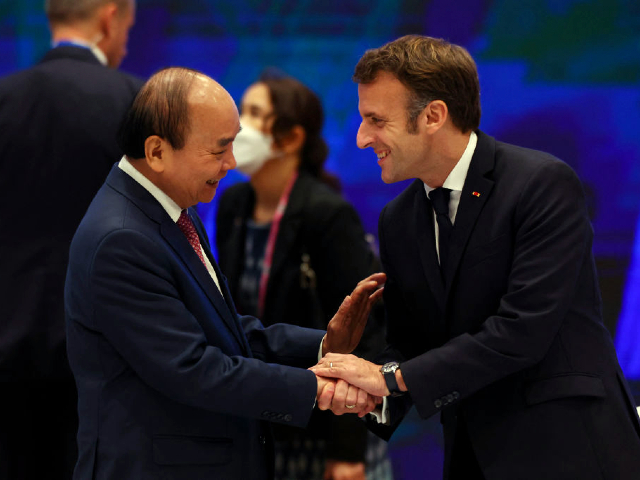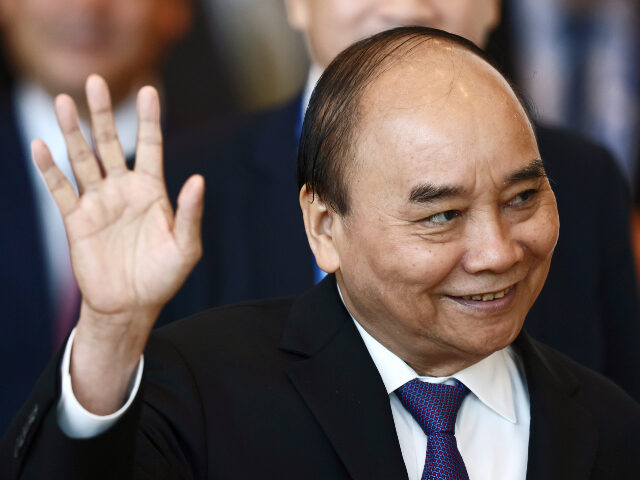Vietnamese President Nguyen Xuan Phuc resigned on Tuesday after the Communist Party blamed him for “violations and wrongdoing” by officials in his administration.
Phuc is the highest-level official toppled by the Vietnamese Communist Party’s much-touted anti-corruption crackdown. His downfall is reportedly making investors nervous about Vietnam’s stability, at a moment when Vietnam is eagerly attempting to poach manufacturing business from its massive neighboring Communist tyranny, China.
Phuc, 68, was prime minister before he became president in April 2021, elected with a sweeping 97.5 percent vote by the National Assembly. He was the first Vietnamese prime minister ever to be elevated to the presidency by the Vietnamese legislature.
Phuc took over the presidency from Nguyen Phu Trong, who was promoted to become General Secretary of the Communist Party of Vietnam, the highest office in the regime. Much like next-door dictator Xi Jinping of China, Trong is currently serving an unprecedented third term in his top office.
Trong appears to be the primary mover and shaker behind Phuc’s downfall, tightening his grip on power by first sacking two deputy prime ministers for corruption on January 5 and now holding Phuc responsible for the alleged misdeeds of his junior officials.
Communist Party authorities accused both of the deputy prime ministers of corruption related to the Wuhan coronavirus pandemic. They accused one of them, Pham Binh Minh, of tolerating rampant bribery that enabled visiting VIPs to bypass some pandemic travel restrictions. The other, Vu Duc Dam, was allegedly involved in rigging the bidding process for coronavirus test kits.
Both Minh and Dam were fairly well-regarded officials before they were suddenly dismissed and neither was arrested or charged with any specific acts of malfeasance. Most observers saw them as victims of a power play by Trong; Vietnamese media compared them to kindling wood thrown into a “burning furnace.”
There clearly is a great deal of corruption in Vietnam’s government, but the aging and ailing Trong’s top priority seems to be achieving tight control over all “four pillars” of the state – the president, prime minister, parliamentary chair, and Communist Party general secretary – so he can appoint a hand-picked successor. He is aggressively cutting short the careers of ambitious politicians, like Minh and Phuc, who he sees as too pro-Western.

Vietnam’s President Nguyen Xuan Phuc (L) and France’s President Emmanuel Macron greet each other as they attend the “APEC Leaders’ Informal Dialogue with Guests” event during the Asia-Pacific Economic Cooperation (APEC) summit in Bangkok on November 18, 2022. (Photo by ATHIT PERAWONGMETHA / POOL / AFP) (Photo by ATHIT PERAWONGMETHA/POOL/AFP via Getty Images)
Phuc was not only ousted as president on Tuesday but forced to resign from every one of the offices he held, including membership in the Politburo. As with Minh, he was seen as a fairly successful occupant of his largely ceremonial office until this month, overseeing a slate of effective pro-business reforms, and was often touted as a potential successor to Trong.
“Fully being aware of his responsibilities before the party and people, he submitted an application to resign from his assigned positions, quit his job and retire,” the Vietnamese government said in a statement about Phuc’s surprising departure.
The official statement acknowledged Phuc’s “great efforts in leading, directing and administering the [Chinese coronavirus] epidemic prevention and control, achieving important results.”
The statement said Phuc was resigning because he “took political responsibility as leader when several officials, including two deputy prime ministers and three ministers committed violations and shortcomings, causing very serious consequences.”
Vice President Vo Thi Anh Xuan was announced as acting president until the National Assembly can appoint a permanent replacement. The South China Morning Post (SCMP) heard rumors that Trong might “assume the presidency and hold two positions, he said, as was the case in 2018 when former president Tran Dai Quang died in office.”
“Others suggest the current Minister of National Defence Phan Van Giang will be promoted. To Lam, the current minister of public security, is also touted as a possible candidate,” University of New South Wales professor emeritus Carlyle Thayer told the SCMP.
University of Queensland research fellow Hai Hong Nguyen said the spate of unusually sudden firings – especially the first-ever ousting of a sitting president – “would be a shock to the public” because such comings and goings are usually orchestrated by the Communist Party as much more stately affairs:
[Nguyen] added that the immediate implication of the shake-up was that “anyone can be questioned and requested to step down” while the long-term implication was that “it will create and deepen a ‘hidden’ conflict among officials at the top level”.
“This would be more dangerous for the regime,” Hai Hong Nguyen said, adding that no one knew or could tell the reason for the shake-up except for the members of the Central Committee and the Politburo.
“But like the recent dismissal of the two deputy prime ministers, there was a link to political responsibility of the leadership when the junior staff had been disciplined,” Hai Hong Nguyen said, noting that while corruption was mentioned as one of the reasons, that “needs to be verified”.
Some analysts thought Phuc might have been taken down by ambitious rivals with their eyes fixed on the General Secretary’s chair, while others mentioned rumors that Phuc’s wife is about to be caught up in an embarrassing scandal over pandemic profiteering. It could even be something of a soft coup by the Vietnamese military, as military officials appear to be taking over some of the administrative positions vacated by Trong’s anti-corruption crusade.
Some thought the escalating anti-corruption drive/political purge/succession battle would alarm the public and shatter Vietnam’s international image as a stable environment for investors, while others felt the continuing presence of Trong as iron-fisted ruler would avoid the perception of instability.
“Fighting corruption is often cheered by foreign investors, and with good reason: it is supposed to improve the rule of law and create a level playing field. But the politicized nature of Vietnam’s anti-corruption campaign should give investors pause,” cautioned Control Risks lead Southeast Asia analyst Linh Nguyen, as quoted by the SCMP.
Zachary Abuza, professor of strategy security at the National War College in Washington, took a much more pessimistic view in a column for Nikkei Asia on Tuesday.
Abuza thought Vietnam risks losing the perception of stability that made Vietnam an attractive alternative to China for multinational investors, and therefore losing the edge that made it one of Asia’s fastest-growing economies last year – growth largely credited to Phuc’s pro-business reforms.
“Clearly, politics are at play ahead of a Communist Party congress expected to be held midyear. Unlike China, which has very distinct factional politics, elite Vietnamese politics are much pettier and more personal,” Abuza noted.
“The ongoing purge is bound to rattle foreign investors, especially since the leading victims have been administrators seen as competent and honest. Given the intense competition around Asia and beyond to attract foreign investors looking for an alternative to China, Vietnam will begin to lose out if the authorities are no longer seen as stable and capable,” he warned.

COMMENTS
Please let us know if you're having issues with commenting.